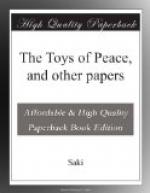“I think you are the most odious person in the whole world,” said Reggie’s sister-in-law. Which was not strictly true; more than anybody, more than ever she disliked Mrs. Pentherby. It was impossible to calculate how many quarrels that woman had done her out of.
MARK
Augustus Mellowkent was a novelist with a future; that is to say, a limited but increasing number of people read his books, and there seemed good reason to suppose that if he steadily continued to turn out novels year by year a progressively increasing circle of readers would acquire the Mellowkent habit, and demand his works from the libraries and bookstalls. At the instigation of his publisher he had discarded the baptismal Augustus and taken the front name of Mark.
“Women like a name that suggests some one strong and silent, able but unwilling to answer questions. Augustus merely suggests idle splendour, but such a name as Mark Mellowkent, besides being alliterative, conjures up a vision of some one strong and beautiful and good, a sort of blend of Georges Carpentier and the Reverend What’s-his-name.”
One morning in December Augustus sat in his writing-room, at work on the third chapter of his eighth novel. He had described at some length, for the benefit of those who could not imagine it, what a rectory garden looks like in July; he was now engaged in describing at greater length the feelings of a young girl, daughter of a long line of rectors and archdeacons, when she discovers for the first time that the postman is attractive.
“Their eyes met, for a brief moment, as he handed her two circulars and the fat wrapper-bound bulk of the East Essex News. Their eyes met, for the merest fraction of a second, yet nothing could ever be quite the same again. Cost what it might she felt that she must speak, must break the intolerable, unreal silence that had fallen on them. ’How is your mother’s rheumatism?’ she said.”
The author’s labours were cut short by the sudden intrusion of a maidservant.
“A gentleman to see you, sir,” said the maid, handing a card with the name Caiaphas Dwelf inscribed on it; “says it’s important.”
Mellowkent hesitated and yielded; the importance of the visitor’s mission was probably illusory, but he had never met any one with the name Caiaphas before. It would be at least a new experience.
Mr. Dwelf was a man of indefinite age; his high, narrow forehead, cold grey eyes, and determined manner bespoke an unflinching purpose. He had a large book under his arm, and there seemed every probability that he had left a package of similar volumes in the hall. He took a seat before it had been offered him, placed the book on the table, and began to address Mellowkent in the manner of an “open letter.”
“You are a literary man, the author of several well-known books—”
“I am engage on a book at the present moment—rather busily engaged,” said Mellowkent, pointedly.




